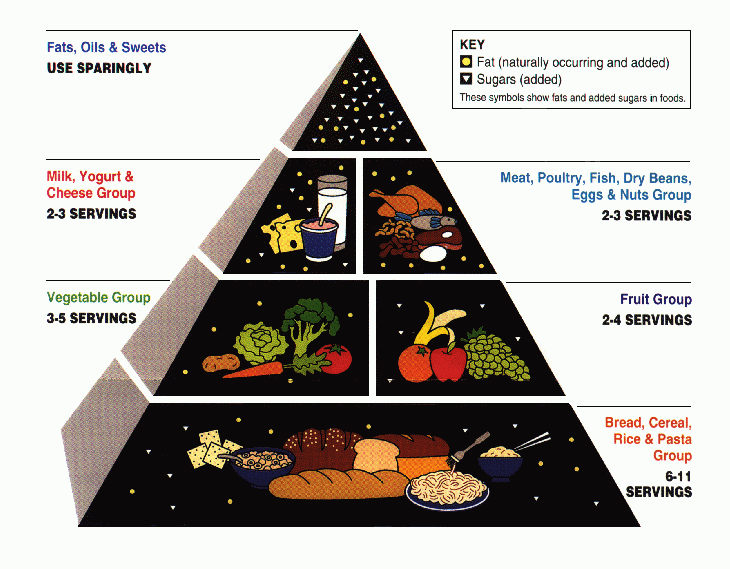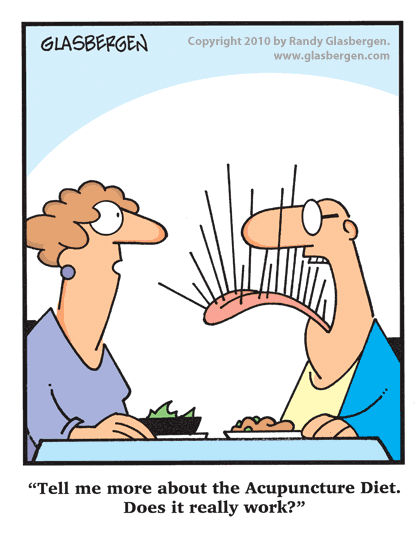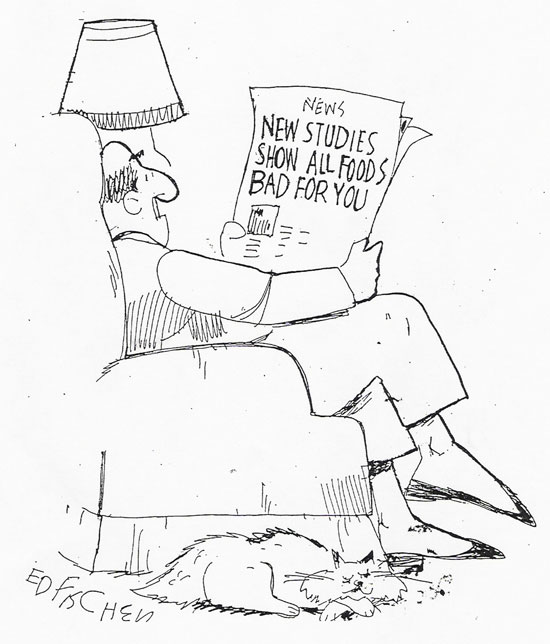My
mom used to call me her "challenge" child. I did not follow directions
or commands without understanding and agreeing with what I was being
told to do. My favorite question was "why?" I don't know why I have
always been like this, but as I've matured I've learned to harness this
instinct for more constructive purposes and drive my parents less crazy.
(Although my dad, a perennial scientist/engineer, was far more amused
by this quality than my mom.) Every morning for breakfast, my mom would
let me choose between regular Cheerios with banana slices or Honey Nut
Cheerios. My mom ate Cheerios every single morning with slices of
bananas and either skim milk or soy milk (once that got trendy). For
years, the back of the Cheerios box had the government-issued food
pyramid that clearly instructed us to eat six to eleven servings of
bread, cereal, rice, and pasta. Being
very health conscious, my
mom filled our house with all the recommended foods, and also extolled
the dangers of any food high in fat or cholesterol. Well, I didn't
challenge her on this then, but, sorry mom, I'm here to be your
challenge child once again...
Who amongst us has never
been under the assumption that eating fat makes us fat? In my 28-years
of life, I haven't known a single person who didn't think this, or if
they did, they never vocalized it near me. Sure some people ignore "fat
is bad" and choose to "indulge," but I don't recall anyone telling me
that fat is nutritious until
the medical establishment came out with a tentative approval of "good fats" in the late 1990's.
This fat demonization was something I never questioned. On the surface,
it is a linear line of logic: you eat fat and then your body stores
this same fat. The "good fat" approval in the 1990's was our first clue
that there was something wrong with this conclusion. Today, let's look
at a brief history of nutrition as it relates to medicine and politics. In future posts, I'll
get into more detail on the science and evidence that underpins our
current paradigm.
First, let's rewind to a time when
our society didn't actually agree that fat was bad for us, which
surprisingly wasn't a medical consensus until the early 1980's (and then
backtracked with the omega-3 asterisk in the late 1990's).
1797: Scottish surgeon,
John Rollo,
detailed his success in treating diabetes in British Army officers
stationed in the fruit-rich Caribbean with an "all meat" diet.
1863: An obese Brit, William Banting, published his
"Letter on Corpulence Addressed to the Public," where
he detailed a diet that helped him lose weight by giving up bread,
milk, sugar, beer, and potatoes. His booklet was so popular in Britain
that his name ("banting") became synonymous with dieting.
1889:
Joseph von Mering and Oskar Minkowski observe that surgically removing
the pancreas led to an increase in blood sugar, followed by a coma and
eventual death.
1922: Two Canadian doctors,
Frederick Banting and Charles Best, realize that homogenizing the
pancreas and injecting the derived extract reversed diabetes mellitus.
They win the 1923 Nobel Prize in Medicine for this discovery.
1925:
French scholar, Jean Anthelme Brillat-Savarin, describes in "The
Physiology of Taste" how fat prevents obesity by allowing for satiety.
His book was so popular that it never went out of print and
remains available today).
1952:
President Eisenhower has a heart attack. The U.S. medical establishment
is receiving many questions regarding the cause of heart disease and research on the topic
becomes popular.
1953: Frederick Sanger sequences insulin.
This is officially the "discovery" of insulin, since even though it had
been isolated and used, we did not previously know it's chemical
composition. Sanger receives a Nobel Prize in Chemistry for his work in
1958.
This brings us to the era where our modern
nutritional guidelines were established. Two prominent doctors, John
Yudkin and Ancel Keys, have a rather public, ongoing academic spar on
the cause of cardiovascular disease. Yudkin strongly condemns sugar
("pure, white, and deadly") as the culprit, while Keys believes the
cause is "artery clogging" saturated fat and cholesterol. Both sides
have a lot of compelling data and this debate plays out in the
scientific community until politics gets involved.
In
1967, Senators Bobby Kennedy and Joseph Clark toured the South to check
on the progress of the Economic Opportunity Act of 1964, the landmark
legislation of Kennedy's "War on Poverty." The senators saw thousands of
American children who were going hungry to the point of starvation. CBS
News covers the trip in a special program called "Hunger in America."
The public attention to the issue causes increased political interest in
the issue, particularly during the presidential election. The Senate
debates the issue and forms the U.S. Senate Select Committee on
Nutrition and Human Needs chaired by Senator George McGovern and, rather
quick by Washington standards, becomes functional in 1968. (Historical
context: Bobby Kennedy was assassinated on June 5, 1968 and Richard
Nixon is elected president on November 5, 1968.)
In
1969, the committee works with the Nixon administration to organize the
White House Conference on Food, Nutrition, and Health. The official
recommendations from this bipartisan conference were to expand the food
stamp program, improve child nutrition programs, improve other
nutritional programs, and increase consumer protection information
activities (e.g., nutrition labels). This is the impetus for the
committee to create official nutrition recommendations.
For
several years, the select committee held hearings in which it heard
from academics, educators, nutritionists, doctors, and the public.
What's most clear from the testimony, is that there is no consensus.
The USDA even acknowledges on their official website that there was much controversy regarding the results. As
I've alluded to before, the then-president of the National Academy of
Sciences, Phil Handler, issued the following rebuke in his testimony:
''What right has the federal government to propose that the American
people conduct a vast nutritional experiment, with themselves as
subjects, on the strength of so very little evidence that it will do
them any good?''
The motivations for the guidelines
weren't malicious: they began with a society distressed at the societal
failure of starving children in our own backyard. That being said, the
guidelines were somewhat reckless. There was political pressure to
produce something concrete from all these years of hearings, but all
those hearings really produced was a lack of scientific consensus and no
incontrovertible evidence for specific foods. Yet, the committee built a
consensus for the guidelines by going with what seemed to have the most
support.
The official U.S. nutritional guidelines
were issued in 1977. Americans were instructed to increase their
carbohydrate intake to 55 to 60 percent of calories and to limit dietary
fat intake to no more than 30 percent of calories, particularly in
regard to saturated fat. I'll get into further detail on the "evidence"
behind this recommendation, but to summarize here, the reasoning for
this looks similar to the "calorie is a calorie" logic.
"If
a heart attack is caused by fat being trapped in arteries, we need to
reduce the amount of fat we are ingesting so it doesn't build up in our
arteries." Here again this reasoning disregards the fact that the human
body metabolizes macronutrients in different ways for specific reasons.
It's also a bit like blaming water for a clogged drain. "Pour less water
down the drain and the pipe won't get clogged" doesn't sound logical to
most people, yet this is exactly the same logic behind reducing fat
intake. Is the plaque building up in our arteries a product of fat? Or
is fat just getting stuck in something ELSE that is building up in our
arteries?
There is other epidemiological evidence
that has led to this consensus that fat causes heart disease; however,
these studies conclusions are scientifically shaky. These same studies
that are cited for why we should reduce fat intake, were strongly
disagreed with when they were first published. I'll break a few of these
key studies down in detail in a future post.
The point
is, we didn't yet have the science to give nutritional recommendations
based in hard facts. But a few powerful individuals decided IT SHOULD BE
DONE ANYWAY. Since the late 1970s, the scientific community has
developed a much better understanding of endocrinology (the study of
hormones and the metabolism) and has much better evidence to establish
revised nutritional recommendations. Unfortunately, these revised
nutritional recommendations are contradictory to what is now
conventional wisdom and it's difficult to reverse course 180 degrees.
That's why this is something that may slowly build to become
conventional wisdom, but for now will only reach the independent
thinkers who seek it out.
I'll leave you with the following thought from Gary Taubes, keeping in mind the above timeline: "According
to Katherine Flegal, an epidemiologist at the National Center for Health
Statistics, the percentage of obese Americans stayed relatively
constant through the 1960's and 1970's at 13 percent to 14 percent and
then shot up by 8 percentage points in the 1980's. By the end of that
decade, nearly one in four Americans was obese. That steep rise, which
is consistent through all segments of American society and which
continued unabated through the 1990's, is the singular feature of the
epidemic. Any theory that tries to explain obesity in America has to
account for that. Meanwhile, overweight children nearly tripled in
number. And for the first time, physicians began diagnosing Type 2
diabetes in adolescents. Type 2 diabetes often accompanies obesity. It
used to be called adult-onset diabetes and now, for the obvious reason,
is not."




















